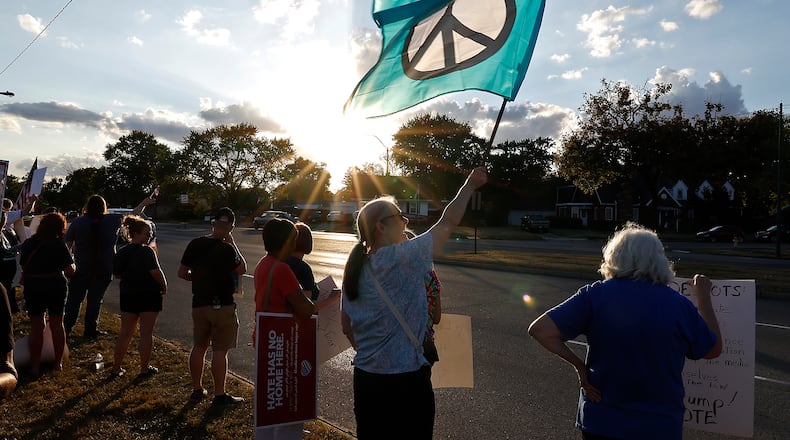Springfield Neighbors United aims to support all immigrants who face deportation or detainment, with a large portion of those being from Haiti.
“Guided by the principles of justice, mercy, and love, we stand with those whose dignity, safety, and access to justice are threatened due to their status as immigrants or refugees,” the group says in it mission statement.
Marian Stewart, spokesperson for the collective, said the effort is grounded in the idea of loving your neighbor. She said this is not just a faith issue, but also a moral one.
“In your heart of hearts, what does the difference between love and hate look like in your life, and in reflection at the end of the day, where do your actions fall?” Stewart urged people to ask themselves. “Do you want to be known as a person who believed in love, spread hate, or were silent?”
Tensions over Haitian immigration have been high in Springfield for a few years, but the issue spiked during the presidential campaign last fall, illustrated by events on back-to-back nights in September.
One set of residents gathered for a peace rally outside the Democratic Party office, calling for Springfield residents to welcome Haitians and support them. The next night, another set of people shared frustrations about Haitians' impact on housing costs, driver safety and health care services at an event hosted by Republican politician Vivek Ramaswamy.
Credit: Bill Lackey
Credit: Bill Lackey
The new Springfield Neighbors United effort has representation from the Haitian community, and is growing, Stewart said. Springfield Neighbors United meets weekly and encourages anyone interested to join.
Vilès Dorsainvil, board president of the Haitian Community Help and Support Center is a member of the group and said having this support sends a signal that the community is supportive and organizing to make sure their neighbors are protected. He said non-Haitian community members would not rally around Haitian immigrants if they were not peaceful, good people.
Springfield’s large Haitian immigrant population has been estimated at 12,000 to 15,000, although there have been more recent reports of immigrants leaving the city. The group was thrust into the national spotlight in September after Republican leaders magnified baseless claims that Haitians were eating people’s pets. This was despite local officials and the woman who wrote the original Facebook post later saying there was no evidence it had ever happened.
Since then, President Donald Trump has said he would order mass deportations, including in Springfield. The vast majority of Haitian immigrants in the city are believed to be here under Humanitarian Parole, with many having gained Temporary Protected Status or another legal status.
Trump issued a flurry of executive orders after inauguration this week, including one instructing the Department of Homeland Security to end the parole program that temporarily allows migrants from Cuba, Haiti, Nicaragua and Venezuela to enter the U.S.
Ohio Attorney General Dave Yost on Wednesday announced he and 18 other state attorneys general had asked the incoming Department of Homeland Security to review TPS designations. Though he did not mention Haitian immigrants, this could impact Springfield Haitian residents.
Humanitarian Parole allows immigrants from certain troubled countries to legally enter the U.S., after which they undergo removal proceedings. Many then pursue a form of legal status to remain in the country, like Temporary Protected Status.
About the Author


